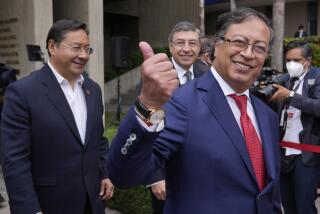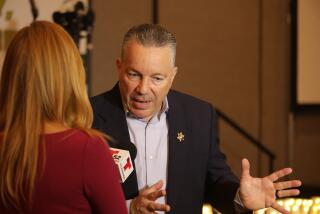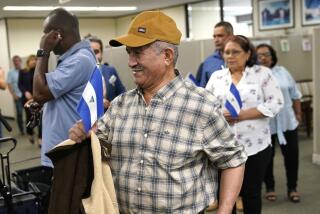Contras’ Radio to Offer Soaps and Discontent
- Share via
MIAMI — In the first major move of the contras’ stepped-up war, U.S.-backed rebels soon will launch a powerful clandestine radio broadcast to try to fuel public discontent with the Sandinistas and win popular support inside Nicaragua.
The 50,000-watt broadcasting station, apparently the world’s only AM guerrilla radio channel, is the contras’ biggest effort yet in the political side of the war, which they have largely ignored until now.
“I think the radio is as important as the (insurgent) army,” said rebel spokesman Leonardo Somarriba. “It is the tool we can use to get to the people’s minds.”
Radio Liberacion, as it is named, is expected to be on the air by the first of the year, Somarriba said. The 6 p.m.-to-6 a.m. broadcasts will include anti-Sandinista songs, soap operas, editorials and commentary by rebel leaders.
Barking Dogs, Roosters
Productions already prepared include mocking characterizations of President Daniel Ortega and Interior Minister Tomas Borge speaking in the countryside, complete with sound effects of barking dogs, crowing roosters and piano scales for drama.
The polished programs have high-tech lead-ins with beeping radio signals and canned applause. And always the contras’ message: “Radio Liberacion. . . . The voice of those who have no voice. . . . Thousands of compatriots who form the commandos of liberty in a country oppressed by international communism through nine traitors of the Sandinista front. . . . Communists--enemies of God and man. . . . “
Credibility Sought
Rebel leaders say their news programs will be “objective, without propaganda and without censorship,” in an effort to earn them credibility, a wide audience, and to counter the Sandinista-controlled media in Nicaragua.
“We want to be the No. 1 radio station in Nicaragua,” said Frank Arana, a spokesman for the United Nicaraguan Opposition, the rebels’ umbrella group known as UNO.
U.S. officials who asked not to be identified said the rebel broadcasts would originate in nearby El Salvador, where a leftist guerrilla movement is fighting to oust the U.S.-backed government. Contra sources said only that the transmitter “could be anywhere” and declined to comment further.
The Salvadoran guerrillas receive assistance for their clandestine Radio Venceremos from Nicaragua. Contra leaders said they have studied Venceremos as well as the U.S. government’s Spanish-language Radio Marti, which is beamed at Cuba.
Most Popular Medium
Radio is the most popular medium in poor countries such as Nicaragua and El Salvador, where television is expensive and illiteracy is high among isolated peasants. Radio has been used extensively for “psychological operations” in the Salvadoran government’s counterinsurgency war.
In Nicaragua, the Sandinistas used the clandestine Radio Sandino during their guerrilla war that toppled dictator Anastasio Somoza in 1979. Radio Sandino, now the official party radio, is only a small part of the Nicaraguan government’s work to build political support for the Sandinista party and revolution.
Contra spokesmen said that funding for the radio station did not come out of the $100 million in military and non-lethal aid that Congress approved for the contras this year, but they declined to identify the source or quantity of the “private donations” that they said are supporting the radio.
About 18 writers, sociologists, technicians and others have been working on the radio for the last three months.
Advice From U.S. Officials
U.S. sources say that State Department and CIA officials have advised the rebels on the radio, but contra spokesmen declined to comment on whether they received any assistance. Regional political analysts have said that one of the contras’ major problems has been their lack of a political program and internal propaganda.
“They should have done this a long time ago,” said a U.S. official who asked not to be identified. “They have got to get their message to the population. They have got to articulate what this war is about.”
With the radio, the contras hope to increase the name recognition of their leaders, many of whom are little-known inside Nicaragua. They hope to convince Nicaraguans that they are a nationalistic movement--rather than a U.S. mercenary force, as the Sandinistas portray them in the state-run media--and to show that they are united.
Short-Wave Ineffective
The radio will be run under the name of the United Nicaraguan Opposition. The Nicaraguan Democratic Force, the largest armed group, has had a weaker short-wave radio called 15 de Septiembre which aired two hours daily, but was hard to pick up.
UNO’s Arana, formerly a spokesman for the Nicaraguan Democratic Force, said it would be costly for the Sandinistas to try to scramble or interfere with the broadcast of Radio Liberacion, but that the rebels will have the technical ability to change frequency.
Sandinista spokesmen could not be reached for official comment on the radio, but a Defense Ministry official said off-handedly, “First, let’s see if they get it on the air and then we’ll worry about jamming it.”
The official said that if the Defense Ministry is prompt and truthful in getting military stories out on government radio, “people will continue to believe the government,” but if the rebel radio begins to report information people had not heard, “that would concern us.”
Arana said the radio will report contra military operations and will air messages from exiled political parties, business groups and church leaders to show that they have broad-based support. He said UNO representatives around the world will act as reporters collecting information and newspaper articles to be used on the radio.
The radio will use humor to satirize Sandinista leaders. “We will make them ridiculous, (we will) caricature the Sandinista directors,” Arana said.
Soap operas or drama will be used for propaganda to emphasize Sandinista weaknesses and portray what Arana said were real cases of Sandinista human rights abuses.
A Farmer Named ‘Pancho’
One program scheduled to be broadcast is “Pancho Madrigal,” about a farmer who recounts nostalgic, angry and sad tales bemoaning life under the Sandinistas. In one episode about the unpopular military draft, rural farmers listen as an impersonated Tomas Borge blames the United States for Nicaragua’s problems.
“It is true that U.S. imperialism, the enemies of humanity, are trying to end the accomplishments of the Sandinista popular revolution. It is true that Reagan has an enormous army that constantly attacks us. . . . The solution is the Patriotic Military Service,” the mock Borge says.
In the story, farmer Eugenio Mondragon is left alone when his grandson Pedro is drafted into the army. He frets for Pedro’s safety. Then the local commander calls Mondragon to tell him he “should be happy. . . . Your grandson is a hero of the revolution. . . . Comrade Pedro Mondragon died in action. The contras killed him.”
An Empty Coffin
Mondragon says it is “the Communists” who sent his grandson to fight without proper training. When the young man’s casket arrives, he and his friends open it against the orders of Sandinista officials--only to find that it is empty. His grandson’s body has been left in the mountains.
The story plays effectively on fears of the war and a strong, rural sense of propriety.
Another program is “Tell Me Your Story,” which an announcer says is “written by the bitter reality of Nicaragua under the Soviet boot. . . . Testimony of modern barbarities of international communism.”
In one episode, poor Blanca Undino Mantilla, a beautiful 28-year-old with “deep dark eyes” from the northern area of Nueva Segovia tells the Permanent Human Rights Commission about how state security officials knocked on her door in the night and accused her family of aiding the contras. Using flashbacks of the woman’s tearful testimony, the show recounts how Undino’s father was tortured and killed and she was raped by four Sandinistas.
From Contra Press
Arana said this episode was dramatized from a real report to the opposition human rights group in Managua, and was reported in a contra newspaper. But the existence of such a report could not be verified. A secretary of the commission said there was no report on Undino and the head of the commission was on vacation.
Arana said the broadcasts will encourage Nicaraguans to join the ranks of the contras and to engage in passive resistance against Sandinista programs in order to show their opposition. He said the radio will urge support for Roman Catholic Cardinal Miguel Obando y Bravo, the leading opposition figure in the country.
Arana said the message would be, “If you have to go to the Sandinista Defense Committee meetings, go--but don’t act against your neighbors. Go if you have to go, but do nothing.
“We’re never going to ask for more than is necessary. We will never let a people be sacrificed,” Arana said.
Contra leader Adolfo Calero said he feels the radio is important for combatants who want to be kept informed while in the mountains and who hope to build an internal network of aid and an urban base of support.
“For the psychological war, it is very important,” Calero said.
More to Read
Sign up for Essential California
The most important California stories and recommendations in your inbox every morning.
You may occasionally receive promotional content from the Los Angeles Times.













